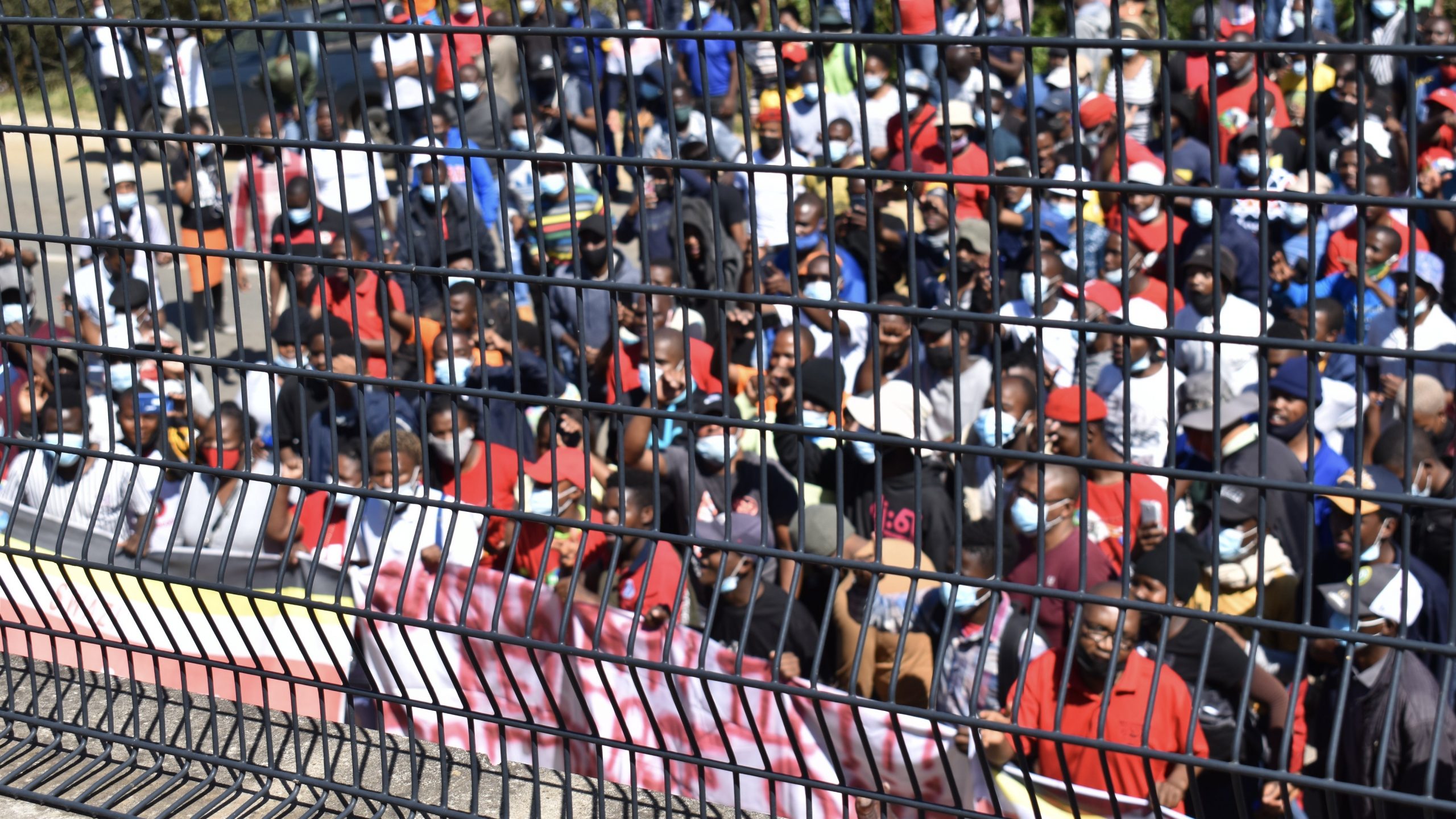Hundreds of pro-democracy protesters demonstrated outside the UN office in Swaziland’s capital, Mbabane, on Friday, September 10 to demand an end to the absolute rule of King Mswati III.
Ten representatives of the Political Party Assembly (PPA), a coalition of five banned political parties, met with the UN Resident Coordinator, Nathalie Ndongo-Seh. In the meeting, representatives of the PPA raised the grievances of the people against Africa’s last absolute monarch, including the urgent issue of brutality by his security forces.
“The United Nations continues to stand in solidarity with the people of Eswatini [to which Swaziland was arbitrarily renamed by the King] & is working to help restore peace to the nation,” UNEswatini said in a statement on social media.
Among the largest of the political parties in the PPA is the PUDEMO, whose spokesperson Sbusiso Syaya told Peoples Dispatch: “Through this demonstration outside the UN office, we want to call on the international community to isolate King Mswati,” he said, adding that only his isolation would be the real recognition of the will of the ordinary people agitating for democracy.
This protest outside the UN office came a day after three of Swaziland’s border gates with South Africa were blockaded from the latter’s side on September 9, as a part of the Global Week of Action in support of pro-democracy protests. These included the Golela border gate in KwaZulu-Natal Natal Province, Matsamo border gate in Mpumalanga Province, and Oshoek border gate in Mpumalanga.
Border Blockade in solidarity
Members of the Congress of South African Trade Unions (COSATU), who had assembled on the South African side in solidarity, were joined by members of Swaziland’s pro-democracy organizations and parties, including the Communist Party of Swaziland (CPS) and the People’s United Democratic Movement (PUDEMO).
At the Golela gate, members of these parties were welcomed by Skhumbuzo Mdlalose, the region’s provincial chairperson of COSATU. Over the last two decades, COSATU has held many border blockades in support of the pro-democracy forces in Swaziland.
The demonstration at Golela was also addressed by COSATU general secretary Bheki Ntshalintshali, and saw the participation of unions including the Swaziland National Association of Teachers (SNAT) and Trade Union Congress of Swaziland (TUCOSWA).
Congress of South African Trade Union (COSATU) General Secretary Cde Bheki Ntshalintshali is addressing its alliance members, PUDEMO,TUCOSWA, SNAT who are in a blackade currently underway at Golela port of entry (Border between Eswatini and South Africa). pic.twitter.com/BXqkh6139T
— SADTU KZN (@SADTUKZN) September 9, 2021
“COSATU’s solidarity has been in action not in words and we will never rest until the people of Swaziland are free,” PUDEMO president Mlungisi Makhanya said in his address during the demonstration.
President of Pudemo delivering a speech at the Golela border blockage protest. He said “Cosatu’s solidarity has been in action not in words and we will never rest until the people of Swaziland are free. #global_week_of_action #BorderBlockade_Cosatu pic.twitter.com/ALN4W3v3cX
— PUDEMO (@PUDEMO) September 9, 2021
At the Oshoek border gates, where CPS general secretary Thokozane Kenneth Kunene addressed the demonstration, a regalia with Mswati’s face was burnt.
Regalia with Mswati's face burned at the Oshoek border gate protest calling for democracy in Swaziland. #DemocracyNow #GlobalWeekOfAction pic.twitter.com/mK6VAA79Be
— CPS (@CPSwaziland) September 9, 2021
Leaders of the protest movement had decided not to hold any demonstration on Swaziland’s side of the border, to avoid the risk of a massacre, Simphiwe Dlamini, national organizer of the CPS told Peoples Dispatch.
“Instead, our comrades crossed over the border in disguise to participate in the blockade with COSATU members and the Swazi diaspora in South Africa who were also mobilized.” Sbusiso Syaya said that PUDEMO leaders had to cross over into South Africa a day earlier to avoid detection which may have led to arrests.
“Mswati is blood-thirsty”, Dlamini adds. “He is looking for an opportunity to kill protesters. Any demonstration having protesters converge at one place will risk a massacre,” he said.
Organizing self-defense units is an imperative: CPS
The question of how to deal with the King’s repressive security apparatus is not a minor one. The CPS believes that protests should be held, like on Monday, in multiple locations across the country, especially in the rural areas, which for the last months have been galvanized by a strong anti-monarchist sentiment for the first time. This, Dlamini reiterated, will exhaust the security forces and not allow them to concentrate power at one venue.
“We are calling on people to take action locally. Block the roads wherever you are; attack the properties of the King and his associates in your locality,” he said.
The CPS has also concluded that the situation in the country has now matured to a point where locally organized self-defense units have become the need of the hour. Cadres in many rural areas, he said, have already begun work towards this end.
“It is high time we take serious measures to protect our people from the increasing violence by the King’s security forces,” he said, stressing the urgency of this imperative.





